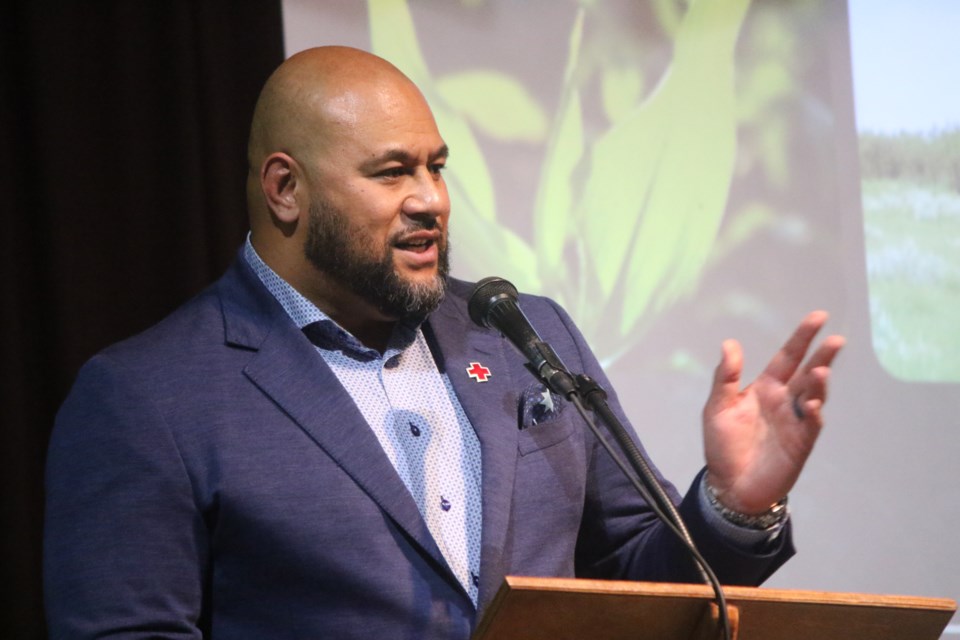WEYBURN - Saskatchewan farmers are tough like professional football players, and demonstrate leadership skills in the same way, former Roughrider Luc Mullinder told an audience of producers and business owners at the Weyburn Chamber’s Ag Appreciation Night on Nov. 7.
Currently the vice-president of the Canadian Red Cross in Saskatchewan, he played for nine years in the CFL, eight of those years as a defensive lineman with the Riders, including as a member of the Grey Cup team of 2007.
He was the guest speaker for the Ag Appreciation banquet at McKenna Hall, and passed on his take on leadership styles, encouraging farmers to make sure they adopt the style that suits them best as they lead in the agricultural community.
Telling producers he has a tremendous amount of respect for them, Mullinder said, “The Golden Sheaf Award is really cool. There’s no other industry that aligns with pro football like ag does. They require similar characteristics, and you have to be tough s.o.b.’s – but I’m preaching to the choir here,” he said.
Noting he’s friends with farmer Mark Overbye of the Lake Alma area, he told about how the farmer had fallen off a ladder and shattered his shins, and army-crawled all the way to the house to call for help.
“The only thing he was worried about was who was going to care for the farm the next day,” said Mullinder. “You guys are another level of toughness … I don’t think I have the stamina to handle what you guys handle.”
When it comes to leadership, he said, “It’s not what you’re capable of, it’s what you’re willing to do.”
He noted that winners of the Golden Sheaf Award have to meet a number of criteria, and they are not unlike what pro football players have to exhibit: longevity, engagement with the community, innovation and leadership, and being a good steward of the land, among other things.
In looking at today’s athletes, Mullinder said he doesn’t see a lot of good leadership qualities, which is required today, both of athletes and of farmers in their operations.
“It’s incredibly important, to give the next generation a chance. Your industry really depends on the next generation,” said the former Rider.
Commenting on the recent departure of Rider coach Dave Dickenson, he said, “I think the whole reason coach Dickenson is no longer there is he just didn’t connect. He failed to hold players accountable, and accountability is so much easier to foster when you connect with your players.”
One of the keys is to know which style of leadership is required in a given situation, he said, and depending on one’s talents and personality, leadership can be given up front, from the middle, or from the back.
Harking back to his playing days, he noted teammate Eddie Davis was an example of someone who was a front-line leader, someone who led by example by what he was doing.
“Front-line leaders are going to show everybody the way,” said Mullinder. “Guys like Eddie foster a winning attitude. I loved to watch fellows with Eddie Davis.”
Noting he came from university in Michigan, he admitted he wasn’t the fastest player or the strongest player, but he did the best he could in his position on defence. One time as a new player, he asked Davis how he watches game film to gain pointers from them, and Davis sat him down for an hour during training camp and explained what he saw, what he looked for and how the QB calls plays as a play was developing.
Noting the average player had two and a half seasons, he played for nine seasons, and he attributed some of that to Davis’s leadership.
Mullinder gave an example also how he learned leadership to use at the Red Cross without realizing he was doing it. He told of how, during forest fire season, at one point the Red Cross had to set up some 800 cots to accommodate evacuated families from the areas affected by fire, and he was out early one morning setting the cots up before anyone else had arrived.
He was told later that staff and volunteers of the Red Cross were inspired by his efforts, as he was vice-president of the organization but was out on the floor, setting up cots, and he inspired the volunteers to follow suit and work as hard as he did.
Mullinder said local producers, including the Golden Sheaf winners, need to be front-line leaders to show the younger generation what needs to be done for the industry to survive and grow in the coming years.
Leading from the middle, or the centre, involves helping those who don’t understand to come along. On the football team, he said, this involved those leaders to see the younger players who maybe don’t get the programs yet, and to bring them along in their understanding.
“The front-line leaders are too busy doing stuff, that’s why the centre leaders need to be bringing them along,” said Mullinder, pointing to a player like Mike McCullough as an example of a centre leader. “He could go into any group and fit in. He’d always make sense of a play for everybody,” said Mullinder.



